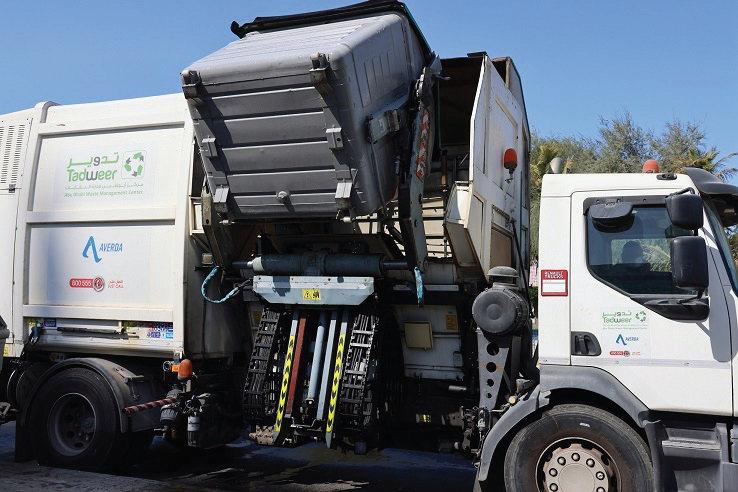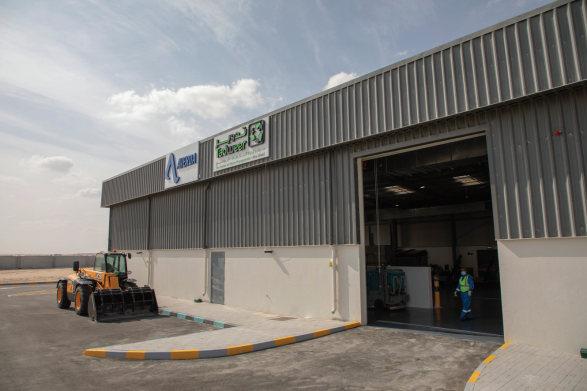
4 minute read
Facilitating effective waste management
Facilitating effective
waste management
Abu Dhabi Waste Management Center (Tadweer) discusses how pursuing the latest innovative technology and encouraging foreign participation can facilitate climate-friendly waste management and effective recycling in the Middle East. Robert Daniels reports.
Tadweer
ABOVE:Tadweer collected 588,425 tons of waste in the Emirate of Abu Dhabi in Q1 2021. According to an article published on BioEnergy Consultant, the Middle East remains one of the most prolific generators of waste in the world, with high standards of living, ineffective legislation, infrastructural roadblocks, and insufficient funding all contributing to the difficulty in implementing integrated and effective waste management strategies in the region. However, many countries are preparing to take on this challenge, identifying ways to encourage recycling practices and reduce waste, including through the research and utilisation of new technologies and raising public awareness. Health, Safety & Security Review Middle East spoke to Tadweer, the entity responsible for all activities related to the development of waste management facilities and services in the Emirate of Abu Dhabi, to hear their expert insights on waste management in the region.
What needs to be done for the region to implement more effective waste management and recycling?
The Emirate of Abu Dhabi has implemented an integrated waste management approach to deal with its ever-increasing amounts
of waste in line with the objectives of the Abu Dhabi Government’s Vision 2030. To reinforce this vision, Tadweer works closely with the private sector and with internationally recognised experts in waste collection, transportation, treatment and disposal. Additionally, Tadweer pursues opportunities and attracts investment to upgrade and or develop its waste management infrastructure and services. The private sector and international participation has supported Tadweer to ensure that all its facilities operate according to the highest standards.
To facilitate development of state-of-art waste management infrastructure, regulations in support are essential. This will not only raise the level of participation standards but will also help in bringing new technology as well as the transfer of knowledge and expertise.

How can effective waste recycling make a difference in reducing the climate impact?
Effective recycling supports Tadweer’s plan to minimise waste production and achieve the Emirate’s target of diverting 75% of waste away from landfills. Tadweer works closely with private sector partners to further enhance recycling and develop innovative solutions to mitigate the harmful effects of waste on the environment.
The company operates dedicated facilities to recycle everything from construction and demolition waste to agricultural and animal waste, from farms to used tires, as well as recyclables recovered from municipal solid waste. Such initiatives boost our capacity to recover materials from discarded products and use recycled materials instead of virgin raw materials.
For example, recycled aluminium from scrap and used cans saves 95% of energy required for aluminium production from bauxite. Tadweer ensures the optimal performance and continued efficiency of these facilities through the utilisation of the latest technologies and international best practices. Through promoting sustainable waste management and recycling practices, the company seeks to position Abu Dhabi as a leading contributor to global sustainability.
Image Credit: Tadweer
Tadweer has recently set up a facility for the treatment of fallen stock collected from farms across Abu Dhabi.
Amenities for Recyclable Waste. Since then, several such facilities have been rolled out across Abu Dhabi mainland and Al Ain city as they have proven to be highly effective in encouraging members of the community to adopt ecofriendly lifestyles and practices. These amenities allow the public to participate in the segregation of recyclable waste at source by allocating coloured bins for different types of wastes and reusable materials. Such innovations go a long way in reducing the high costs associated with traditional waste treatment practices by turning waste into valuable materials through increased community participation in waste segregation from source.
What innovations has your company included to optimise the recycling processes?
To support the common goals towards waste reduction and creating a responsible and sustainable society, Tadweer launched in July 2018 an innovative initiative called Civic
What challenges did the pandemic bring to waste recycling?
The COVID-19 pandemic has posed unprecedented challenges to Tadweer’s operations, as it was actively involved in implementing the National Disinfection Programme. In close collaboration with strategic partners, Tadweer stepped up its cleaning and sterilisation operations across the Emirate during the programme, which lasted for 227 days. The team worked around the clock and carried out intensive disinfection operations across Abu Dhabi’s neighbourhoods using the latest equipment, technologies, and disinfectants that are safe for both humans and the environment, approved by relevant domestic and international authorities.
To ensure the timely and efficient treatment of medical wastes generated by hospitals and quarantine sites dedicated for COVID-19 patients in Abu Dhabi, Tadweer increased the capacities of its existing incinerators by adding two rotary kiln incinerators of 1.5 tons/ hour each in Abu Dhabi and 500 Kg/ hour in Al Ain, and deployed three mobile incineration plants at Al Mafraq Hospital, the field hospitals in Abu Dhabi National Exhibition Centre (ADNEC), and the Emirates Field Hospital in Mohammed Bin Zayed City. With a capacity ranging from 150kg to 300kg per hour, the new mobile incinerators can treat medical waste at temperatures of up to 1,200 degrees Celsius, and are equipped with advanced air emission cleaning systems to keep the environment clean and safe.
This allowed us to ensure that all waste related to the virus is treated with high flexibility at the various sources of generation, thus minimising the risk of transporting the contaminated waste through the populated areas of the community and the risks associated with the handling and managing of the waste during loading, unloading and treatment. ❖








